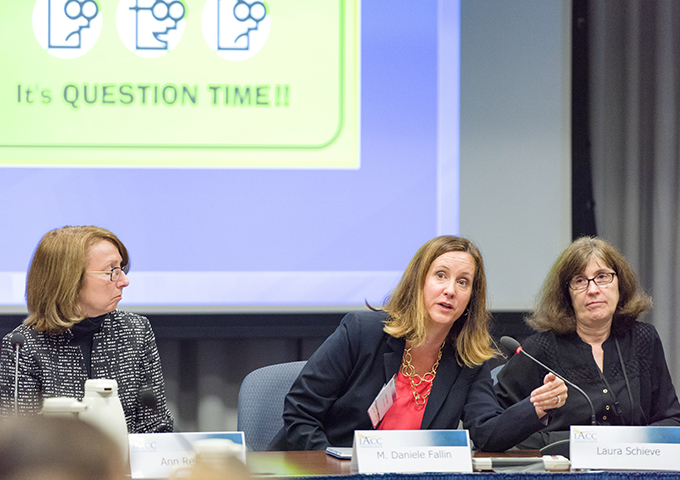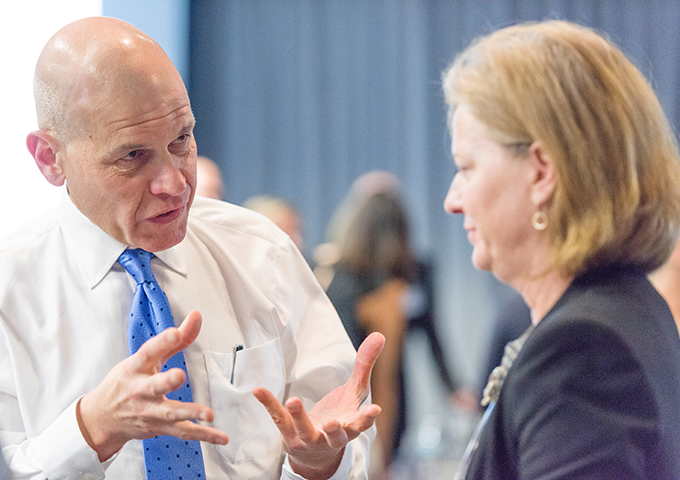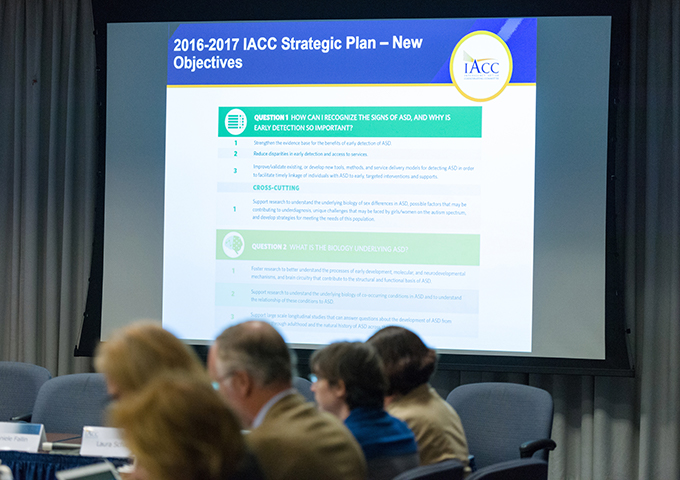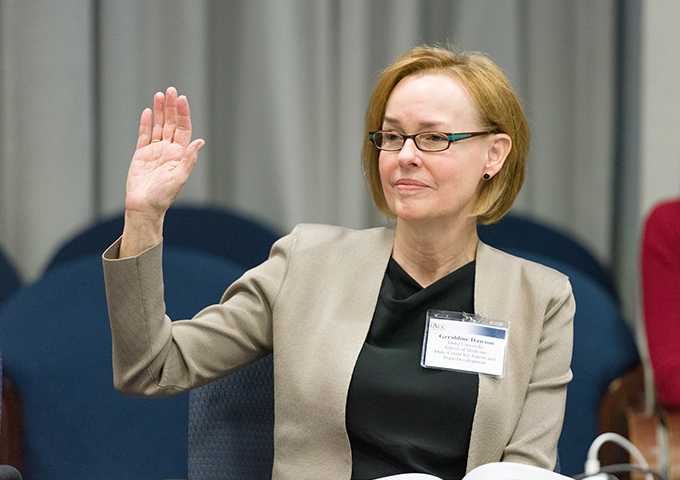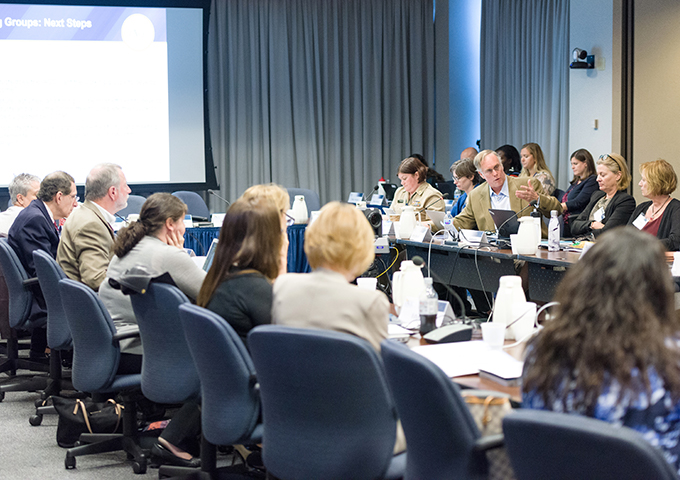Full Committee Meeting - October 24, 2017
 Full Webcast
Full Webcast
 Photo Gallery
Photo Gallery
 Announcement
Announcement
| Topic | Topic Description |
|---|---|
| Date: | Tuesday, October 24, 2017 |
| Time: | 9:00 a.m. to 5:00 p.m. Eastern |
| Place: | National Institute of Mental Health 6001 Executive Boulevard, NSC, Conference Rooms C and D Rockville, MD 20850 |
| Metro Stop: | White Flint Metro Station (Red Line) |
| Remote Access: | Conference Call: Dial: 800-369-1740 Access code: 5135863 Webcast: https://videocast.nih.gov If you experience technical problems with the webcast or conference call, please call 240-668-0302 or e-mail IACCPublicInquiries@mail.nih.gov. |
| Registration: | Online pre-registration |
| Agenda: | To discuss business, updates, and issues related to ASD research and services activities. |
| Cost: | The meeting is free and open to the public. |
| Deadlines: | Notification of intent to present oral comments: Friday, October 13, 2017 by 5:00 p.m. ET Submission of written/electronic statement for oral comments: Tuesday, October 17, 2017 by 5:00 p.m. ET Submission of written comments: Tuesday, October 17, 2017 by 5:00 p.m. ET Please note: Written public comments and statements accompanying oral public comments should be sent to IACCPublicInquiries@mail.nih.gov. For IACC Public Comment guidelines please see:http://iacc.hhs.gov/meetings/public-comments/guidelines/ |
| Public Comment: | Any member of the public interested in presenting oral comments to the Committee must notify the Contact Person listed on this notice by 5:00 p.m. ET on Friday, October 13, 2017, with their request to present oral comments at the meeting, and a written/electronic copy of the oral presentation/statement must be submitted by 5:00 p.m. ET on Tuesday, October 17, 2017.
A limited number of slots for oral comment are available, and in order to ensure that as many different individuals are able to present throughout the year as possible, any given individual only will be permitted to present oral comments once per calendar year (2017). Only one representative of an organization will be allowed to present oral comments in any given meeting; other representatives of the same group may provide written comments. If the oral comment session is full, individuals who could not be accommodated are welcome to provide written comments instead. Comments to be read or presented in the meeting will be assigned a 3-5 minute time slot depending on the number of comments, but a longer version may be submitted in writing for the record. Commenters going beyond their allotted time in the meeting may be asked to conclude immediately in order to allow other comments and presentations to proceed on schedule. Any interested person may submit written public comments to the IACC prior to the meeting by e-mailing the comments to IACCPublicInquiries@mail.nih.gov or by submitting comments at the web link: https://iacc.hhs.gov/meetings/public-comments/submit/index.jsp by 5:00 p.m. ET on Tuesday, October 17, 2017. The comments should include the name, address, telephone number, and when applicable, the business or professional affiliation of the interested person. NIMH anticipates written public comments received by 5:00 p.m. ET on Tuesday, October 17, 2017 will be presented to the Committee prior to the meeting for the Committee’s consideration. Any written comments received after the 5:00 p.m. ET, October 17, 2017 deadline through October 23, 2017 will be provided to the Committee either before or after the meeting, depending on the volume of comments received and the time required to process them in accordance with privacy regulations and other applicable Federal policies. All written public comments and oral public comment statements received by the deadlines for both oral and written public comments will be provided to the IACC for their consideration and will become part of the public record. Attachments of copyrighted publications are not permitted, but web links or citations for any copyrighted works cited may be provided. Core Values: In the 2009 IACC Strategic Plan, the IACC listed the “Spirit of Collaboration” as one of its core values, stating that, “We will treat others with respect, listen to diverse views with open minds, discuss submitted public comments, and foster discussions where participants can comfortably offer opposing opinions.” In keeping with this core value, the IACC and the NIMH Office of Autism Research Coordination (OARC) ask that members of the public who provide public comments or participate in meetings of the IACC also seek to treat others with respect and consideration in their communications and actions, even when discussing issues of genuine concern or disagreement. |
| Please Note: | Remote Access: The meeting will be open to the public through a conference call phone number and webcast live on the Internet. Members of the public who participate using the conference call phone number will be able to listen to the meeting but will not be heard. If you experience any technical problems with the webcast or conference call, please call 240-668-0302 or e-mail IACCPublicInquiries@mail.nih.gov. Individuals wishing to participate in person or by using these electronic services and who need special assistance, such as captioning of the conference call or other reasonable accommodations, should submit a request to the Contact Person listed on this notice at least five days prior to the meeting. Security: Visitors will be asked to show one form of identification (for example, a government-issued photo ID, driver’s license, or passport) and to state the purpose of their visit. Also as a part of security procedures, attendees should be prepared to present a photo ID at the meeting registration desk during the check-in process. Pre-registration is recommended. Seating will be limited to the room capacity and seats will be on a first come, first served basis, with expedited check-in for those who are pre-registered. Meeting schedule subject to change. Information about the IACC is available on the website: http://www.iacc.hhs.gov. |
| Contact Person: | Ms. Angelice Mitrakas Office of Autism Research Coordination National Institute of Mental Health, NIH 6001 Executive Boulevard, NSC, Room 6183A Rockville, Maryland 20852 Phone: 301-435-9269 E-mail: IACCPublicInquiries@mail.nih.gov |
Back to Top
 Agenda
Agenda
| Time | Event |
|---|---|
| 9:00 a.m. |
Joshua Gordon, M.D., Ph.D. Director, National Institute of Mental Health (NIMH) and Chair, IACC Susan Daniels, Ph.D. Director, Office of Autism Research Coordination, NIMH, and Executive Secretary, IACC |
| 9:10 |
Susan Daniels, Ph.D. Director, Office of Autism Research Coordination, NIMH, and Executive Secretary, IACC |
| 9:30 |
Autism Activities at CDC
Nicole Dowling, Ph.D.Chief, Developmental Disabilities Branch, CDC SEED: Overview of Methods and Data Collection
Laura Schieve, Ph.D.Epidemiologist, Developmental Disabilities Branch, CDC ASD Risk Factors Study: Autism Spectrum Disorder and Birth Spacing
Laura Schieve, Ph.D.Epidemiologist, Developmental Disabilities Branch, CDC ASD Risk Factors Study: Maternal Infection and Fever during Pregnancy and Risk of Autism Spectrum Disorder
Presented by M. Daniele Fallin, Ph.D.Sylvia and Harold Halpert Professor and Chair, Department of Mental Health, Johns Hopkins Bloomberg School of Public Health, Joint Appointment in Medicine on behalf of Lisa Croen, Ph.D. Senior Research Scientist, Kaiser Permanente ASD Genetic Associations: Peripheral Blood DNA Methylation and ASD
M. Daniele Fallin, Ph.D.Sylvia and Harold Halpert Professor and Chair, Department of Mental Health, Johns Hopkins Bloomberg School of Public Health, Joint Appointment in Medicine ASD and Child Health Effects: Gastrointestinal Symptoms in 2 – 5 Year Old Children
Ann Reynolds, M.D.Associate Professor, Pediatrics-Developmental Pediatrics University of Colorado School of Medicine Characteristics of Children with ASD: A Novel Protocol for Characterizing Dysmorphology to Enhance the Phenotypic Classification of ASD
Stuart Shapira, M.D., Ph.D.Chief Medical Officer and Associate Director for Science National Center Birth Defects and Developmental Disabilities CDC |
| 10:45 |
Morning Break
|
| 11:00 |
Susan Daniels, Ph.D. Director, Office of Autism Research Coordination, NIMH, and Executive Secretary, IACC Joshua Gordon, M.D., Ph.D. Director, National Institute of Mental Health (NIMH) and Chair, IACC |
| 12:00 p.m. |
Lunch
|
| 1:00 |
Joshua Gordon, M.D., Ph.D. Director, National Institute of Mental Health (NIMH) and Chair, IACC Karen Mowrer, Ph.D. Science Policy Analyst, Office of Autism Research Coordination, NIMH |
| 2:15 |
Sarah Cassidy, M.Sc., Ph.D. Assistant Professor University of Nottingham, United Kingdom Lisa Horowitz, Ph.D., M.P.H. Staff Scientist and Clinical Psychologist National Institute of Mental Health Colleen Carr, M.P.H. Deputy Director National Action Alliance for Suicide Prevention |
| 3:30 | |
| 4:00 |
Afternoon Break
|
| 4:15 |
Susan Daniels, Ph.D. Director, Office of Autism Research Coordination, NIMH, and Executive Secretary, IACC Joshua Gordon, M.D., Ph.D. Director, National Institute of Mental Health (NIMH) and Chair, IACC |
| 4:45 |
Round Robin
|
| 5:00 |
Closing Remarks and Adjournment
|
Schedule is subject to change. Meeting may end prior to or later than 5:00 PM depending on the needs of the committee. For more information on upcoming events, please see http://iacc.hhs.gov/meetings/iacc-meetings/
Next IACC Full Committee Meeting:
- January 17, 2018 – Location TBD
Back to Top
- October Meeting Minutes (PDF 966KB)
Back to Top
 Speakers
Speakers
Nicole F. Dowling, Ph.D.
Chief
Developmental Disabilities Branch
Epidemiologist
Division of Congenital and Developmental Disorders
National Center on Birth Defects and Developmental Disabilities (NCBDDD)
Centers for Disease Control and Prevention (CDC)
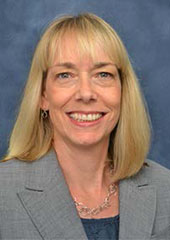
Dr. Nicole Dowling is an Epidemiologist with the Division of Congenital and Developmental Disorders, in the National Center on Birth Defects and Developmental Disabilities (NCBDDD) at the Centers for Disease Control and Prevention (CDC). Dr. Dowling joined the CDC in 2000 and has served, since July 2015, as the Chief of the Developmental Disabilities Branch, where she provides scientific leadership and oversight for CDC’s surveillance and research programs for autism and other developmental disabilities, including the Autism and Developmental Disabilities Monitoring Network (ADDM) and the Study to Explore Early Development (SEED). Previously, as the Associate Director for Science for the Division of Congenital and Developmental Disorders from 2012 - 2015, Dr. Dowling worked collaboratively with experts within and outside the Division to determine the optimal blood folate level for prevention of neural tube defects. Additional contributions during her 17-year career at CDC have included direction of population research with the Office of Public Health Genomics, and research to understand the etiology and outcomes of clotting and bleeding disorders with the Division of Blood Disorders. Dr. Dowling is a graduate of Harvard University and received her Ph.D. in Epidemiology from Emory University.
Laura A. Schieve, Ph.D.
Epidemiologist
National Center on Birth Defects and Developmental Disabilities (NCBDDD)
Centers for Disease Control and Prevention (CDC)
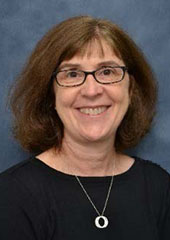
Dr. Laura A. Schieve is the Lead of the Epidemiology Team in the Developmental Disabilities Branch within the National Center on Birth Defects and Developmental Disabilities (NCBDDD), Centers for Disease Control and Prevention (CDC). She directs the Study to Explore Early Development (SEED), a multi-site case-control study examining ASD risk factors and the health and development of preschool-aged children with ASD and other developmental disabilities, and SEED Teen, a follow-up health study of children who participated in the SEED case-control study when they reach adolescence. Dr. Schieve also leads and collaborates on other studies of population prevalence and risk factors for developmental disabilities and is a member of the Technical Expert Panel for the National Survey of Children’s Health. Previously, Dr. Schieve was the Lead for the Assisted Reproductive Technology (ART) Epidemiology Team in the Women’s Health and Fertility Branch at CDC, where she oversaw the development and implementation of the National ART Surveillance System (NASS) and a CDC research program to assess maternal and child health outcomes associated with ART use. She also served as an Epidemic Intelligence Service (EIS) Officer in the (former) Maternal Child Nutrition Branch at CDC. Dr. Schieve has authored or co-authored over 300 scientific publications and abstracts. She received her M.S. and Ph.D. in Epidemiology from the University of Illinois in Chicago.
Lisa Croen, Ph.D.
Senior Research Scientist
Division of Research, Kaiser Permanente Northern California
Director
Kaiser Permanente Autism Research Program
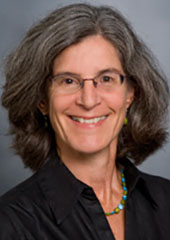
Dr. Lisa Croen is a senior research scientist at the Division of Research (DOR), Kaiser Permanente Northern California (KPNC), and the director of the Kaiser Permanente Autism Research Program. Her research interests include the epidemiology of autism and other neurodevelopmental disorders, environmental exposures and gene/environment interaction, and adverse perinatal outcomes. Currently, Dr. Croen leads several NIH-funded research studies, including the Early Markers for Autism study (EMA); An ASD Enriched Risk (ASD-ER) ECHO cohort; Early Life Exposure to Endocrine Disrupting Chemicals and Child Growth, Adiposity, and Neurodevelopment (ELEGANT) ECHO cohort; and Prenatal SSRI Exposure, Maternal and Child Genotype, and Autism Spectrum Disorders. In collaboration with clinical colleagues, she is conducting a mixed methods study to evaluate autism treatments at KPNC, and investigating health status and healthcare utilization of adolescents and adults with autism. Dr. Croen received her master's degree in public health and her doctorate in epidemiology, both from the University of California, Berkeley.
M. Daniele Fallin, Ph.D.
Sylvia and Harold Halpert Professor
Chair
Department of Mental Health
Johns Hopkins Bloomberg School of Public Health
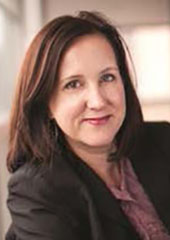
Dr. M. Daniele (Dani) Fallin is is the Sylvia and Harold Halpert Professor and Chair of the Department of Mental Health and the Director of the Wendy Klag Center for Autism and Developmental Disabilities at the Johns Hopkins Bloomberg School of Public Health. She also holds joint appointments in Biostatistics and Epidemiology and in the Johns Hopkins School of Medicine’s Departments of Medicine and Psychiatry. Her research group studies how environments, behaviors, genetic variation, and epigenetic variation contribute to risk for psychiatric disease, particularly autism. She is the PI of the Maryland site of the Study to Explore Early Development (SEED) study, a multi-site case-control study of autism genetic and environmental risk factors and the Early Autism Research Longitudinal Investigation (EARLI) study, a prospective pregnancy cohort focused on causes of autism. She has further led GWAS and EWAS studies based on SEED, EARLI, and other autism samples. She also co-leads the autism-focused research program within the Boston Birth Cohort. She came to Johns Hopkins as an Assistant Professor in 2001 after earning her Ph.D. in Genetic Epidemiology at Case Western Reserve University.
Ann Reynolds, M.D.
Associate Professor
Department of Pediatrics
Developmental Pediatrics
University of Colorado School of Medicine
Children’s Hospital Colorado
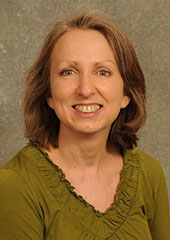
Dr. Anne Reynolds is a Developmental and Behavioral Pediatrician. She is an associate professor of pediatrics at the University of Colorado Denver School of Medicine in the Section of Developmental Pediatrics. She has a long-standing interest in co-occurring medical conditions in children with autism spectrum disorders. She is an Investigator in the CADDRE Study to Explore Early Development (SEED). She has lead the analysis of gastrointestinal symptoms and sleep problems in SEED. Dr. Reynolds received her undergraduate degree from Emory University and her medical degree from the Medical College of Georgia. She did her residency training in Pediatrics at Children’s National Medical Center in Washington, D.C. and her fellowship in Neurodevelopmental Disabilities at Baylor College of Medicine.
Stuart K. Shapira, M.D., Ph.D.
Associate Director for Science (ADS)
Chief Medical Officer
National Center on Birth Defects and Developmental Disabilities (NCBDDD)
Centers for Disease Control and Prevention (CDC)
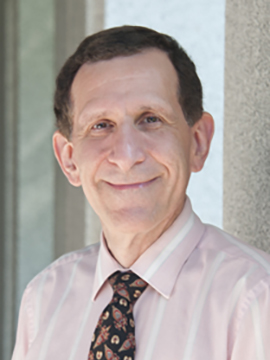
Dr. Stuart K. Shapira is the Associate Director for Science and Chief Medical Officer in the National Center on Birth Defects and Developmental Disabilities (NCBDDD) at the Centers for Disease Control and Prevention (CDC) and a member of the Interagency Autism Coordinating Committee (IACC). Previously, Dr. Shapira served as a medical officer on the Pediatric Genetics Team in NCBDDD. His research activities included dysmorphology of autism, birth defects epidemiology, and newborn screening. Prior to joining the NCBDD in 2005, Dr. Shapira practiced clinical genetics and metabolic genetics at Baylor College of Medicine in Houston and at the University of Texas Health Science Center in San Antonio. He currently serves as CDC liaison to the Committee on Genetics for the American Academy of Pediatrics, as chairman of the Dysmorphology Workgroup for the Centers for Autism and Developmental Disabilities Research and Epidemiology, and as NCBDDD liaison of the Interagency Collaborative to Advance Research in Epilepsy. Dr. Shapira received his Ph.D. in Genetics and his M.D. from the University of Chicago. He completed a residency in Pediatrics and a clinical fellowship in Genetics and Metabolism at Boston Childrens Hospital. He also completed dual research fellowships in Genetics and Metabolism, and in Allergy and Immunology at Harvard Medical School. Dr. Shapira is board-certified in Clinical Genetics, Biochemical Genetics, and Molecular Genetics.
Sarah Cassidy, M.Sc., Ph.D.
Assistant Professor
University of Nottingham
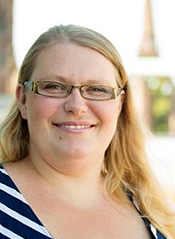
Dr. Sarah Cassidy leads the Atypical Development Research Theme in the Centre for Research in Psychology, Behaviour and Achievement, which she formed in 2014. She explores how individuals with Autism Spectrum Condition (ASC) process emotions in realistic social situations, using eye tracking among other methods. Related lines of research are developing and evaluating interventions to improve emotion processing in those with ASC, and exploring the contribution of sensorimotor abilities to the development of social skills. Her second area of research explores whether adults with ASC are more at risk of negative outcomes, such as mental health problems, suicidal thoughts and behaviors, than other clinical groups, and the associated triggers and protective factors. Dr. Cassidy completed her M.Sc. and Ph.D. degrees at Nottingham University, followed by a postdoctoral research position at the Autism Research Centre (ARC), University of Cambridge.
Lisa Horowitz, Ph.D., M.P.H.
Staff Scientist/Clinical Psychologist
Intramural Research Program
Office of the Clinical Director
National Institute of Mental Health
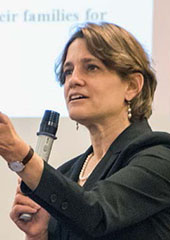
Dr. Lisa Horowitz is a Staff Scientist/Clinical Psychologist in the NIMH Intramural Research Program at the National Institutes of Health. She serves as a senior attending with a specialty in pediatric psychology on the Psychiatry Consultation Liaison Service in the Office of the Clinical Director. The major focus of Dr. Horowitz’s research has been in the area of suicide prevention and detection. She was lead PI on the development of two suicide screening instruments for the pediatric emergency department (ED), the Risk of Suicide Questionnaire (RSQ), and the Ask Suicide-Screening Questions (ASQ). Dr. Horowitz is also lead PI on several other instrument development studies that will include children with intellectual disabilities, and pediatric and adult medical inpatients (asQ’em) a tool created to include pediatric medical/surgical patients in the emergency department setting. Dr. Horowitz received her B.A. from Tufts University. After obtaining her doctorate in clinical psychology from George Washington University, Dr. Horowitz completed a Pediatric Fellowship at Boston Children’s Hospital, as well as a Health Service Research Fellowship in the Clinical Effectiveness Program at Harvard Medical School, and obtained a Master of Public Health at the Harvard School of Public Health.
Colleen Carr, M.P.H.
Deputy Director
National Action Alliance for Suicide Prevention
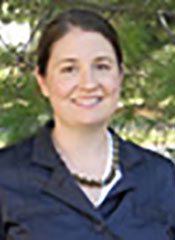
Ms. Colleen Carr is the Deputy Director at the National Action Alliance for Suicide Prevention. She is responsible for advancing policy efforts, delivering technical assistance focused on policy analysis and system change; developing high-level public and private-sector leadership communications and briefings; engaging Action Alliance Executive Committee members, and advancing Action Alliance priority initiatives and sustainability efforts. She has over ten years of experience working in public health and suicide prevention. Ms. Carr received her undergraduate degree in public policy analysis from the University of North Carolina at Chapel Hill and her Master of Public Health from Boston University.
Back to Top
 Materials
Materials
IACC Business Related Materials:
- Agenda (PDF – 224 KB)
- IACC Roster
- HHS Report to Congress on Young Adults and Transitioning Youth
- 2016-2017 IACC Strategic Plan for ASD
- 2014-2015 IACC ASD Research Portfolio Analysis Report
- 2017 IACC Summary of Advances Nominations (PDF – 502 KB)
- Speaker Bios (PDF – 502 KB)
Back to Top
 Slides
Slides
- IACC Meeting Full Slide Set (PDF 9MB)
| Presentation | Presenter(s) |
|---|---|
| The HHS Report to Congress on Young Adults and Transitioning Youth with Autism Spectrum Disorder (PDF – 427 KB) | Susan Daniels, Ph.D., Director, Office of Autism Research Coordination, NIMH, and Executive Secretary, IACC |
| Autism Activities at CDC: Update on the Study to Explore Early Development (SEED) (PDF – 1.7 MB) | Nicole Dowling, Ph.D., Chief, Developmental Disabilities Branch, CDC |
| SEED: The Study to Explore Early Development (PDF – 2 MB) | Laura Schieve, Ph.D., Epidemiologist, Developmental Disabilities Branch, CDC |
| Autism Spectrum Disorder and Birth Spacing: Findings from the Study to Explore Early Development (PDF – 1.7 MB) | Laura Schieve, Ph.D., Epidemiologist, Developmental Disabilities Branch, CDC |
| Maternal Infection and Fever During Pregnancy and Risk of Autism Spectrum Disorders: Findings from the Study to Explore Early Development (SEED) (PDF – 216 KB) | M. Daniele Fallin, Ph.D., Sylvia and Harold Halpert Professor and Chair, Department of Mental Health, Johns Hopkins Bloomberg School of Public Health, Joint Appointment in Medicine |
| ASD Genetic Associations: Peripheral Blood DNA Methylation and ASD (PDF – 2.5 MB) | M. Daniele Fallin, Ph.D., Sylvia and Harold Halpert Professor and Chair, Department of Mental Health, Johns Hopkins Bloomberg School of Public Health, Joint Appointment in Medicine |
| Gastrointestinal Symptoms in 2-to 5-Year-Old Children (PDF – 3 MB) | Ann Reynolds, M.D., Associate Professor, Pediatrics-Developmental Pediatrics University of Colorado School of Medicine |
| Characteristics of Children with ASD: A Novel Protocol for Characterizing Dysmorphology to Enhance the Phenotypic Classification of ASD (PDF – 1 MB) | Stuart Shapira, M.D., Ph.D., Chief Medical Officer and Associate Director for Science National Center Birth Defects and Developmental Disabilities CDC |
| Committee Business (PDF – 1.5 MB) | Susan Daniels, Ph.D., Director, Office of Autism Research Coordination, NIMH, and Executive Secretary, IACC Joshua Gordon, M.D., Ph.D., Director, National Institute of Mental Health (NIMH) and Chair, IACC |
| Suicidality in Autism (PDF – 758 KB) | Sarah Cassidy, M.Sc., Ph.D., Assistant Professor, University of Nottingham, United Kingdom |
| Screening for Suicide Risk in Youth with Autism Spectrum Disorder and other Neurodevelopmental Disorders (PDF – 977 KB) | Lisa Horowitz, Ph.D., M.P.H., Staff Scientist and Clinical Psychologist, National Institute of Mental Health |
| Aligning National Efforts to Prevent Suicide (PDF – 1.5 MB) | Colleen Carr, M.P.H., Deputy Director, National Action Alliance for Suicide Prevention |
| Summary of Advances Discussion (PDF – 854 KB) | Susan Daniels, Ph.D., Director, Office of Autism Research Coordination, NIMH, and Executive Secretary, IACC Joshua Gordon, M.D., Ph.D., Director, National Institute of Mental Health (NIMH) and Chair, IACC |
Back to Top
 Public Comments
Public Comments
- Oral Public Comments (PDF – 388 KB)
- Written Public Comments (PDF – 1 MB)
Back to Top
- Meeting Transcript (PDF – 680 KB)
Back to Top








